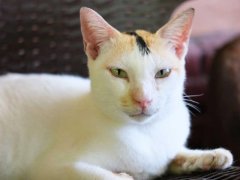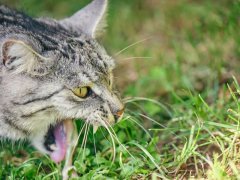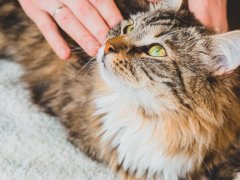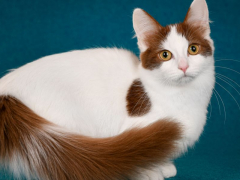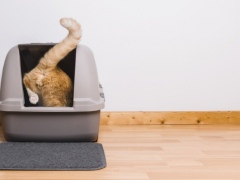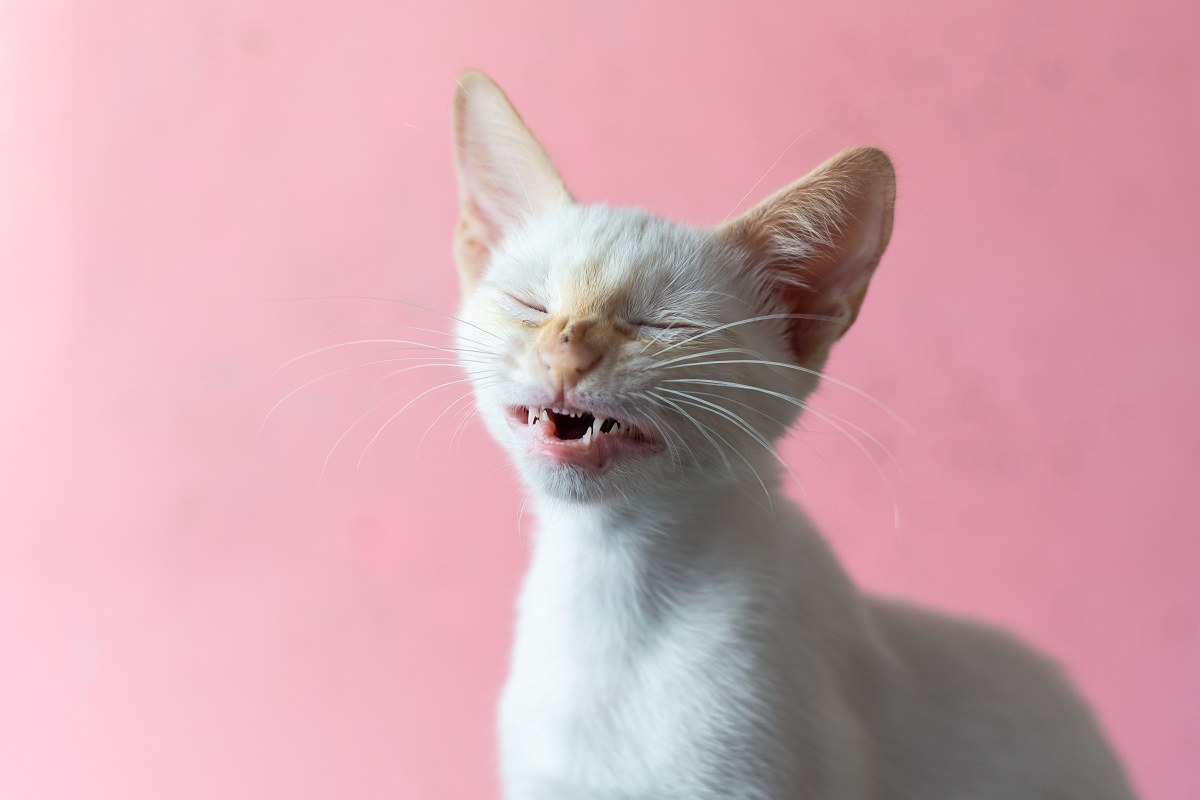
The classic appearance of a kitten just about to sneeze. Gaby Vieira / Shutterstock.com
The excitement of having a new kitten can also come with anxiety and many questions. Is a kitten sneezing normal or a problem that needs to be addressed?
Sneezing can be normal for any cat, including kittens. Similar to us, something might tickle their nose and cause a sneeze. That cute little nasal “pfft” along with a scrunched up face can be normal and healthy if the body is trying to get rid of an irritant. However, sneezing should be infrequent. Regular, persistent sneezing is not.
In this article, we’ll delve into some focused reasons why young kittens may sneeze, concerns to look for, and when your kitten may need to see the vet.
Causes of Sneezing in Kittens
Kittens’ immune systems are not fully developed. Largely for this reason, infections are the most common cause of persistent sneezing in juvenile cats, although we’ll also discuss some rarer conditions.
1. Viral infections
Virus infections are the most common underlying cause of persistent sneezing in kittens. Viruses commonly affect kittens due to their immature immune systems and the common stress of moving to new, unfamiliar locations at this age. Viral sneezing usually has either no discharge or possibly a little clear, watery material.
There are two viruses that are most commonly involved in kitten sneezing, which together are responsible for about 90% of all upper respiratory infections in cats:[1]
- Feline Herpesvirus (FHV): Also called feline viral rhinotracheitis or FVR, feline herpesvirus can affect cats of any age – but kittens are most susceptible. The virus spreads through contact with eye and nose discharge as well as saliva. Since cats can be chronic carriers, it can be easy for young kittens to pick up the virus from other nearby cats, especially in shelters or outdoor colonies. FHV can also affect the eyes of cats, causing conjunctivitis (inflammation of the tissues around the eyes) and keratitis (inflammation and ulcers on the corneal surface of the eye).
- Feline Calicivirus (FCV): Also common in young kittens, FCV often first appears at the back of the mouth, where it can cause oral irritation and ulceration. However, it may spread to the nasal passages, causing sneezing. Most cases are self-limiting in otherwise healthy kittens, but some strains of calicivirus may cause more serious cases of pneumonia.
Because it is on many peoples’ minds, SARS-CoV-2 (COVID-19) is not a likely cause of sneezing in cats or kittens. Some cats have tested positive after prolonged exposure to a person with COVID-19 and very rarely may have limited symptoms. However, there is very little evidence to suggest a cat can transmit the virus to other animals or people.
2. Bacterial infections
The most common types of bacteria causing upper respiratory symptoms in kittens include Mycoplasma and Chlamydia. Bordetella, the same bacteria that causes kennel cough in dogs, may cause infections in susceptible cats too.
Infections with these bacteria most often occur secondary to a viral infection, especially FHV. Some cats may also be carriers and develop signs of illness under stress, similar to a cat that is a carrier of herpesvirus.
3. Allergens and Irritants
Nasal irritants and allergens like pollen, dust, and cat litter may also cause sneezing. This may appear as either a short sneezing fit or several sneezes in a row that then resolves. If the allergen or irritant is persistent, sneezing may continue.
Other irritants that may cause sneezing (and coughing in cases of feline asthma) include:
- Household cleaners
- Scented candles
- Essential oil diffusers
- Mold
- Cigarette/cigar/pipe smoke
- Vape vapor/mist
- Pesticide sprays
- Perfume
- Litter box dust
4.Foreign Objects
Occasionally, a curious cat might get something stuck up their nose. This might be part of a feather toy, a blade of grass, or a small particle of food. Most often, this will appear as a sudden, persistent sneezing alongside a nasal discharge that only occurs from one nostril.
5. Uncommon Causes
There are some rarer causes of sneezing in kittens. Some of these are more common in older cats.
- Chronic rhinitis: Caused by immune-mediated inflammation and chronic damage to the nasal passage tissue and requiring long-term management. This would be considered rare in kittens as these conditions require time to develop.
- Cleft palate: A congenital condition in which the roof of the mouth does not close properly before birth. This allows communication between the oral cavity and the nasal passages, allowing milk and food to cause irritation and sneezing. The condition is rare but I have seen one case myself. These can lead to serious illness with complications and require advanced surgery to correct, but good outcomes are possible.
- Dental infections: A heavily infected tooth or tooth root abscess can cause sneezing and one-sided nasal discharge. Dental infections are common in older cats but would be considered a very rare cause of sneezing in kittens since their teeth haven’t had time to develop periodontal disease at that age.
- Cancer: Nasal cancer in cats is generally uncommon, even in older cats. It makes up only 1% of cancer in cats. [2]
- The three most common types are squamous cell carcinoma (SCC), other types of carcinoma, and lymphoma. While one of my own cats developed nasal lymphoma at the age of 6, I have yet to see another cat develop it that young. I only see 3–4 cat patients a year that truly have confirmed nasal cancer.
When to Call the Vet
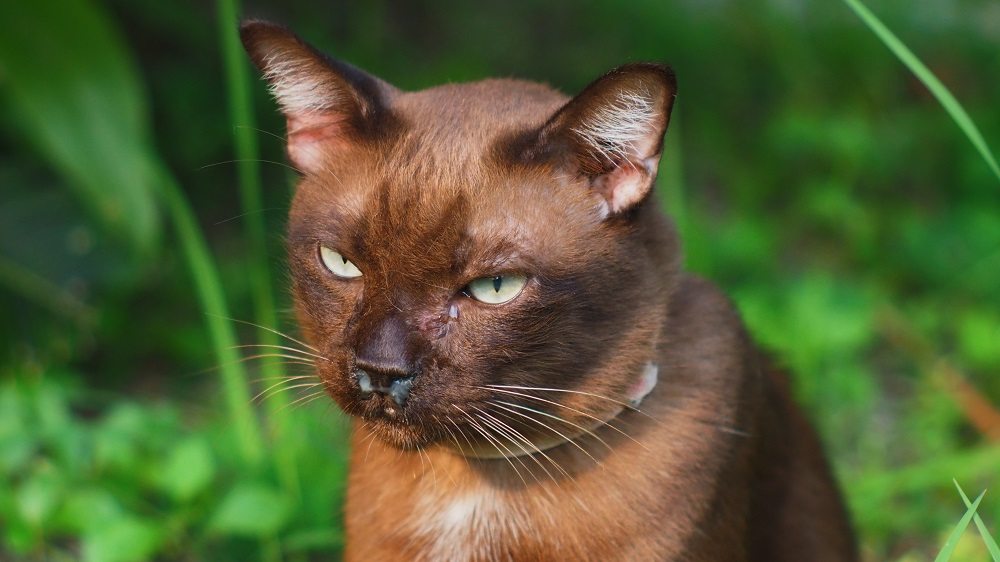
Sneezing with white, yellow, or green discharge from the nose and/or eyes is one important reason to seek veterinary care. RJ22 / Shutterstock.com
Mild sneezing can be managed at home, especially if your kitten is bright and eating and has no other signs of illness. However, there are some signs that should be red flags that your kitten needs medical attention.
- Persistent sneezing: Episodes lasting longer than 7 days should warrant a vet trip. Although sneezing from some infections, such as herpesvirus, may take three weeks to resolve, don’t wait that long to seek medical care. Your vet will help determine the cause, including if it is just an uncomplicated virus that is best treated with home care.
- Thick or discolored nasal discharge: Yellow or green discharge is uncommon with viral or allergy-related causes of sneezing alone. This can be seen more with bacterial infections as well as some of the less common causes we reviewed.
- Discharge that has blood in it: This can be caused by nasal passage irritation from recurrent sneezing. Your vet will also try to evaluate the possibility of infection, foreign material, or a mass in the nasal passage.
- Poor appetite and/or lethargy: This may be caused by obstruction of the nasal passages where a cat cannot smell their food or can be related to a fever. Given their small size, kittens can become affected by dehydration and malnourishment.
Treating Sneezing in Kittens
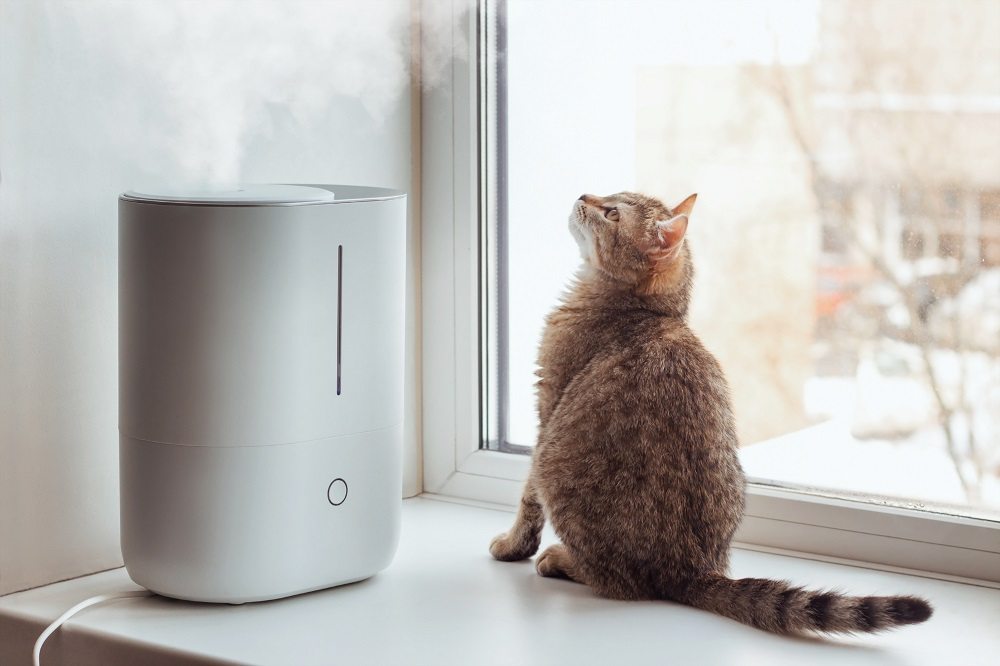
Steam therapy can help loosen nasal congestion. Marina Demeshko / Shutterstock.com
In a majority of cases of sneezing in kittens, your veterinarian will advise some home care therapies and monitoring at home.
Most cases of upper respiratory viral infections in kittens resolve on their own within about three weeks. This assumes the kitten is in a stable, low-stress home environment with good nutrition.
Antivirals
There are limited options to treat upper respiratory viral infections in cats directly.
Famciclovir is an antiviral medication that may be used off-label in some cases to treat cats with FHV-1. This may be more likely in cases of persistence, frequent recurrence, or in environments where stress and viral transmission cannot be well controlled (such as an overcrowded animal shelter).
Lysine (or L-lysine) is an amino acid that gained popularity many years ago as a way of reducing the symptoms and severity of herpes viral infection in cats. It has fallen out of favor for mainstream use in recent years since its method of action could not be proven. However, there are many veterinarians who still see anecdotal evidence for its use in individual patients.
Antibiotics
Antibiotics are only indicated for the treatment of bacterial infections. Because 90% or more of upper respiratory conditions causing sneezing in cats are viral, most cases of sneezing in kittens will resolve without them.
Testing to detect bacterial involvement may be considered, but the relevance of these test results can be difficult to interpret in the respiratory tract where some bacterial organisms may live normally. In kittens with discolored nasal discharge, fever, or reduced appetite are present alongside sneezing, a veterinarian may determine antibiotics are appropriate to use.
Advanced Care
If your kitten develops more severe signs associated with sneezing, such as fever, poor appetite, and lethargy, your veterinarian may advise other more advanced testing and treatment. This may start with x-rays and bloodwork, and advanced testing could include a CT scan and rhinoscopy (using a video scope to see the nasal passages).
Additional therapies include appetite stimulants, subcutaneous fluids for rehydration, and anti-inflammatory medication like steroids. Although rare, a feeding tube may need to be placed in cats or kittens that have stopped eating because of nasal congestion where other therapies to encourage eating have failed.
Home Care
In many cases of uncomplicated kitten sneezing, your veterinarian will discuss home care therapies to use.
- Steam therapy: Steam helps loosen discharge and clear the nasal passages. The simplest method is to run a hot shower until steam fills the room. Let your kitten breathe in the steam for 10-15 minutes. You can repeat this several times a day if needed. A humidifier in a small space your cat frequents can also help.
- Warm up food: Warm, moist food will release more of an aroma to entice appetite.
- Nose drops: A saline nasal drop several times a day in each nostril can loosen discharge and help clear the nostrils. Kittens’ nostrils are tiny, so this can be a challenge!
- Warm washcloth: gently remove any dried or crusted discharge from your kitten’s nose and eyes with a warm, damp cloth. The moist heat may also help to loosen some congestion.
Avoid Human Nasal Decongestants
It might be a first thought if your kitten seems congested to reach for something in your own medicine cabinet, like cold medicine or a decongestant antihistamine that you might take for nasal congestion yourself. However, common ingredients in these products, like pseudoephedrine and phenylephrine, are highly toxic to cats (and dogs too), so you should never use them in pets.
If your cat may have ingested a human nasal decongestant like phenylephrine or pseudoephedrine, make sure to contact one of the following immediately:
- Your veterinarian or closest veterinary emergency hospital
- ASPCA Animal Poison Control Center (1-888-426-4435)
- Pet Poison Helpline (1-855-764-7661)
Prevention of Sneezing in Kittens
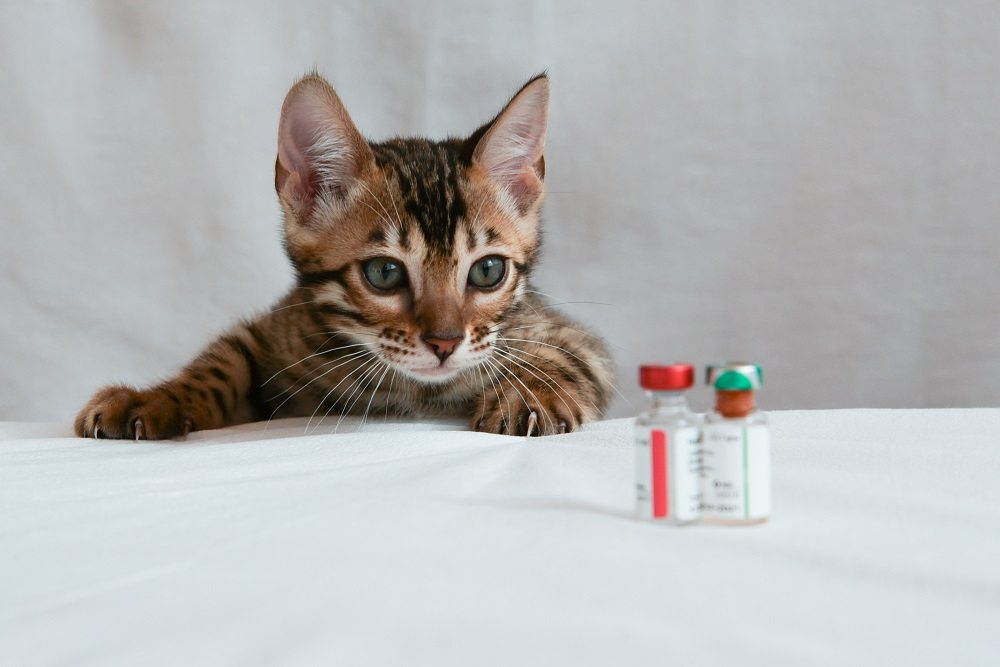
Vaccination is the most effective way to reduce health risks from feline herpesvirus and feline calicivirus, which commonly cause sneezing in kittens. Dina da / Shutterstock.com
There are some recommended actions for kittens that can help prevent some causes of sneezing.
- Vaccination: Feline herpesvirus and feline calicivirus are considered core vaccines and form part of the FVRCP (HCP) combination vaccine.
- Reduce stressors: Stress can contribute to the persistence of viral signs and may delay healing. Stress can also lead to an asymptomatic carrier cat developing a full-blown infection.
- Removing allergens: Keeping your home free from potential irritants may be easier said than done. You may not be able to fully eliminate dust, allergens, and the like. However, you can make a big difference with regular cleaning, adding air purifiers, and using low-dust litter formulas.
-
Feline Upper Respiratory Infection | VCA Animal Hospital | VCA Animal Hospitals. (n.d.). Vca.
-
Nasal cancer in cats | PetCure Oncology. (n.d.). PetCure Oncology.
-
Garnier, P., Viateau, V., Manassero, M., & Maurice, E. (2022). Surgically treated congenital cleft palate in a 4-month-old kitten: medium-term clinical and CT assessment. Journal of Feline Medicine and Surgery Open Reports, 8(1), 205511692210825.
-
Hofmann-Lehmann, R., Hosie, M. J., Hartmann, K., Egberink, H., Truyen, U., Tasker, S., Belák, S., Boucraut-Baralon, C., Frymus, T., Lloret, A., Marsilio, F., Pennisi, M. G., Addie, D. D., Lutz, H., Thiry, E., Radford, A. D., & Möstl, K. (2022). Calicivirus infection in cats. Viruses, 14(5), 937.
-
Feline calicivirus. (2021, September 16). Cornell University College of Veterinary Medicine.
-
Lymphoma. (2023, November 15). Cornell University College of Veterinary Medicine.
-
Merck Animal Health USA. (2022, November 3). Feline Bordetellosis | Merck Animal Health USA.
-
Storey. (2023, April 25). Pseudoephedrine & phenylephrine - American College of Veterinary Pharmacists. American College of Veterinary Pharmacists.
-
Reinhard, C. L., McCobb, E., Stefanovski, D., & Sharp, C. R. (2020). A Randomized, Placebo-Controlled Clinical Trial of Famciclovir in Shelter Cats with Naturally Occurring Upper Respiratory Tract Disease. Animals, 10(9), 1448.
-
Versteegh, H., Zandvliet, M. M. J. M., Feenstra, L. R., Van Der Steen, F. E. M. M., & Teske, E. (2023). Feline Lymphoma: Patient Characteristics and Response Outcome of the COP-Protocol in Cats with Malignant Lymphoma in The Netherlands. Animals, 13(16), 2667.
-
Canadian Veterinary Medical Association. (n.d.). Prevalence of feline herpesvirus-1, feline calicivirus, Chlamydia felis, and Bordetella bronchiseptica in a population of shelter cats on Prince Edward Island: Ingenta Connect.
-
Feline calicivirus infection | VCA Animal Hospitals. (n.d.). Vca.
